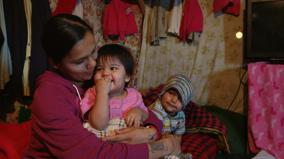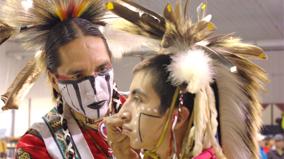New release
Coming
None
 Angry Inuk
Angry Inuk
2016
1 h 22 min
Leaving soon
In her award-winning documentary, director Alethea Arnaquq-Baril joins a new tech-savvy generation of Inuit as they campaign to challenge long-established perceptions of seal hunting. Armed with social media and their own sense of humour and justice, this group is bringing its own voice into the conversation and presenting themselves to the world as a modern people in dire need of a sustainable economy.

Details
In her award-winning documentary, director Alethea Arnaquq-Baril joins a new tech-savvy generation of Inuit as they campaign to challenge long-established perceptions of seal hunting. Armed with social media and their own sense of humour and justice, this group is bringing its own voice into the conversation and presenting themselves to the world as a modern people in dire need of a sustainable economy.
-
writerAlethea Arnaquq-Baril
-
directorAlethea Arnaquq-Baril
-
producerAlethea Arnaquq-BarilBonnie Thompson
-
executive producerBob MooreDaniel CrossDavid Christensen
-
director of photographyQajaaq Ellsworth
-
editorSophie Farkas Bolla
-
composerFlorencia di Concilio
-
featuringAaju PeterJoannie IkkidluakLasaloosie IshulutakIsuaqtuq IkkidluakMikijuk KololaJoshua KangoMeeka MikeNiore IqalukjuakJeannie PadluqAnnie IkkidluakNatsiq Kango
-
additional camera operatorJohn PriceChristopher BallJonathan WrightAnthony Von SeckVan RoykoGeorg SchmittVera PerroneRyan MullinsMark AsplandAlethea Arnaquq-BarilJake HannaStacey Aglok MacDonald
-
location sound recordistDaniel CrossFrans LindellIllona PettersonEdmund Charles Van DykDonald StewartChris Ikonomopoulous
-
skidoo driverJoshua AtagooyukPhilippe LavalléeJonathan WrightLevi PishuktieQajaaq Ellsworth
-
kimmirut fixerAniqniq Nikki Michael
-
production servicesValerie ShamashMarina SerraoDaniela Flori
-
post-production supervisorVictor Sandrasagra
-
post-production coordinatorAzed Kettani
-
visual researchEdmund Duff
-
music supervisorEdmund Duff
-
additional editingEdmund Duff
-
story editorDaniel Cross
-
mentoring directorDaniel Cross
-
marketing managerLeslie Stafford
-
production co-ordinatorFaye YonedaGinette D'SilvaJasmine Pullukatt
-
production supervisorMark Power
-
unit administratorBree Beach
-
centre operations managerDarin Clausen
-
co-producer in developmentStacey Aglok MacDonald
-
graphicsJonathan Wright
-
illustrationsJonathan Wright
-
animationJonathan Wright
-
graphics assistanceJulie Palnychenko
-
colour gradingAlain Omer Duranceau
-
sound designKyle Stanfield
-
dialogue editingCory Rizos
-
re-recording mixerCory Rizos
-
accounting servicesGeneral LedjahDan LacroixStephen Kamp
-
auditorThomas Pietrkowski
-
insuranceGlobalexFront Row Insurance Brokers Inc.
-
legal servicesRemy Khouzam
Education
Pedagogical evaluations and study guides are only available to CAMPUS subscribers.
CAMPUS
Features designed specifically for teachers. Learn more
Already subscribed? Sign in











